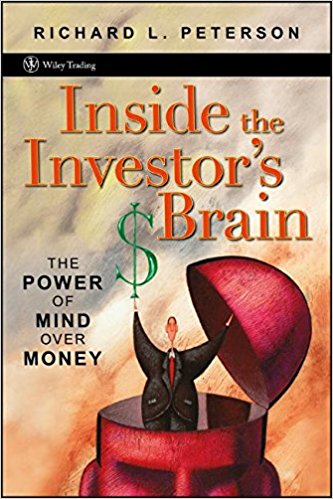Inside the Investor’s Brain Summary

5 min read ⌚
 The Power of Mind Over Money
The Power of Mind Over Money
The world’s history is full of names of reasonable, knowledgeable and intelligent individuals who had money related problems. You must have asked yourself numerous times, if transcending minds can make colossal financial mistakes, what are the chances that you avoid such slipups?
Who Should Read “Inside the Investor’s Brain”? And Why?
“Inside the Investor’s Brain” is a helpful, compelling and entertaining book. Richard L. Peterson examines an expansive scope of emotional and intellectual factors that play a role in making investment decisions. Some are more common than others, and most of the readers, including novices, will recognize them.
There are some factors, on the other hand, that are subtle to the point that they surprise even knowledgeable and experienced investors. The author incorporates and condenses neuropsychology and behavioral analyses and clarifies them using clear writing.
Furthermore, he explains them more in-depth by delineating them with illustrations taken from investors’ lives, their successes, and disasters. We recommend this book to those who are interested in behavioral economics or want to get better at making investment decisions.
About Richard L. Peterson
 Richard L. Peterson is the CEO of the MarketPsych group of companies and is called “Wall Street’s Top Psychiatrist” (Associated Press). He has been published in his financial psychology research in leading academic journals, textbooks, and profiled in NPR, CNBC, the Wall Street Journal, the Financial Times, and the BBC.
Richard L. Peterson is the CEO of the MarketPsych group of companies and is called “Wall Street’s Top Psychiatrist” (Associated Press). He has been published in his financial psychology research in leading academic journals, textbooks, and profiled in NPR, CNBC, the Wall Street Journal, the Financial Times, and the BBC.
Richard has earned cum laude degrees in arts, medicine (MD) and electrical engineering, from the University of Texas. He has performed post-graduate neuroeconomics research at Stanford University and is Board-certified in psychiatry.
“Inside the Investor’s Brain Summary”
Neuroscience gives useful lessons when it comes to this subject. It can provide you with insight on how you decide, mainly when unpleasant decisions take place, such as those who include monetary gains and losses.
It argues that psychological inclinations lead most of the investors adrift. To improve the situation, you have three choices.
- First, gather better data, utilizing propelled research techniques.
- Second, enhance the way you process the data, so you achieve accurate conclusions.
- Third, address the behavioral predispositions that lead you to misuse data.
Many components can affect your investment choices, but, in reality, when it comes to investments, two frameworks exist in the investor’s mind. The first one is looking for rewards, while the other one avoids risks and misfortunes.
Your desires, life, and educational experience influence both of them. You measure your achievements comparing it to your expectations, and the gap that stretches between them dictates your emotional responses. In fact, stress is born there – in that hole and leads to both physical and mental responses.
Furthermore, you assess your execution taking the execution of those around you into consideration, so you feel upbeat or miserable, based on how well you compare to others.
Humans reshape events in their worldviews until the point when the image in their minds concurs with their beliefs about reality. Hopeful and optimistic assumptions can lead to a “placebo effect” that prompts positive execution, while negative convictions deliver a “nocebo effect,” a prophecy of disappointment and frustration.
Making sense of why the market moves in a specific course is difficult because practically everybody included participates in “motivated reasoning.” They are too invested in the outcomes, which creates bias.
“Projection bias” happens when you anticipate that your current emotional state will continue forever. Overcoming such projections is genuinely challenging.
Since feelings shade and alter your perspective of the world, you may not have the capacity to tell when and how they are influencing you. Disgust influences people by making them want to get rid of a specific object, regardless of the possibility to sell at a loss.
Sadness awakes the wish to change and improves, driving people to purchase. Anger creates the illusion of readiness to act. Fear produces feelings of loss of control, which debilitates decision making and empowers information gathering.
Fear may provide a useful reaction in a hazardous circumstance because it can push you to look for answers to your issues. To utilize fear adequately, figure out how to remain calm.
Frenzy can be an awful feeling. It can make you act somehow, anyhow, without thinking, so that you can immediately get away from your circumstances.
In spite of the fact that feelings mutilate your reasoning, you should not hope for an entirely rational financial planning, since it is inconceivable. Instead, be reasonable in the research and planning stages of your preparation for decision making.
At the point when the ideal opportunity for settling on the final decision arrives, allow your instincts to help you. Investing, when you do it in this way, utilizes the two sides of the brain, both the rational and the emotional part.
Key Lessons from “Inside the Investor’s Brain”
1. Characteristics that Define Good Investors
2. Cognitive Issues and Investing
3. Managing Influences on Your Investing
Characteristics that Define Good Investors
“Extroversion versus introversion”: Extroverts are active and outgoing, and like sharing experiences and time with others, while introverts lean toward quiet and isolation. Extroverts have exit plans for a scope of possible market situations, and as statistics show, generally, have higher returns than introverts.
“Neuroticism versus emotional stability”: Neurotics feel tension, depression or outrage and are inclined to frequent mood swings. They are not good investors since they tend to stress too much. However, even though they fear (and expect) negative results, they are passive worriers that don’t create exit strategies.
“Conscientiousness versus impulsiveness”: If you are scrupulous, you will probably have a restrained approach to your investments and cutting losses rapidly.
“Openness to new experience versus traditionalism”: Openness to new thoughts benefits investors in a similar way as extroversion does. Remaining flexible and responsive to new ideas is crucial for succeeding in the market.
Cognitive Issues and Investing
Various difficulties and predispositions shape your venture choices. All investments carry a potion of risk, and investors must pick the amount of risk they can endure.
The vast majority of people are not good at judging probability and most of the time they overestimate the likelihood of both unusual and familiar situations.
Such is the case because intense feelings can mutilate objective reasoning.
Managing Influences on Your Investing
To benefit from the bits of knowledge on neuropsychology, do a self-assessment. Identify your characteristics, find your investment patterns, and get aware of your qualities and shortcomings. Then, work on improving your weaknesses.
Like this summary? We’d Like to invite you to download our free 12 min app, for more amazing summaries and audiobooks.








